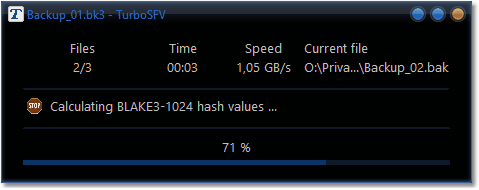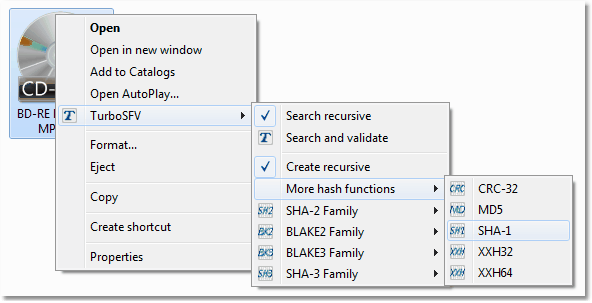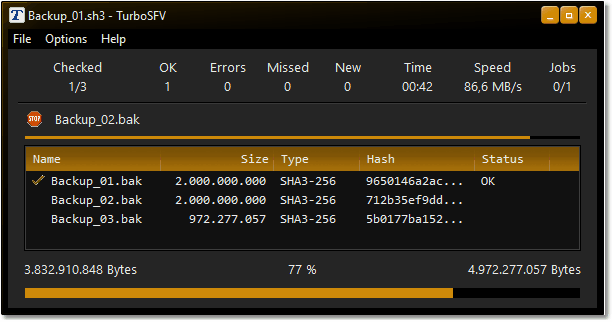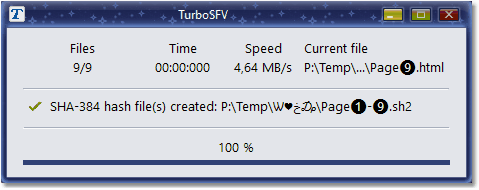| Hash calculation and validation software |
TurboSFV is a utility for the calculation and validation of checksums for files.
The following hash
algorithms
are currently supported:
- CRC-32, MD5, SHA-1 (optionally with SSE - Streaming SIMD Extensions - instructions
like SHA1RNDS4)
- XXH32, XXH64 (xxHash)
- SHA-224 and SHA-256 (optionally with SSE instructions like SHA256RNDS2),
SHA-384, SHA-512 including SHA-512/224 and SHA-512/256 checksums
- BLAKE2S-256, BLAKE2SP-256, BLAKE2B-256, BLAKE2B-384, BLAKE2B-512, BLAKE2BP-256, BLAKE2BP-384 and BLAKE2BP-512
- BLAKE3-256, BLAKE3-512, BLAKE3-1024 and BLAKE3-2048 (optionally by using a special implementation
based on the instruction set extension SSE or AVX2 (Advanced Vector Extensions)).
- SHA3-224, SHA3-256, SHA3-384 and SHA3-512
|

|

|
| Applications |
|
With TurboSFV, you can calculate checksums (hash values) for your files. At a later time, you can validate the
hash values to ensure, that the content of the files has not been changed.
|
|
Typical areas where hash values are used:
|
| File transfer: |
| Before sending files over the network, hash values can be calculated, which can
be used to detect the alteration of data during the transfer. |
| Detect file changes: |
| Detect changed and missed files and find new files which were added to the folders
after the creation of a checksum file.
Page Analyze validation results
describes the analysis capabilities of TurboSFV. |
| Automated observing of directories: |
| Detect any folder changes automated in the background as a service application, by
defining tasks for the TurboSFV service program, available in
TurboSFV XE (eXtended edition), for
automated checksum calculation and validation. |
| Storage mediums: |
| The quality of a storage medium like a DVD can change. By using hash values,
the integrity of stored files can be checked at any time and defective mediums can be detected
and replaced. |
| Quality chain: |
| Useful in companies or organizations, where any change of important data must be
monitored and documented, to ensure the quality of the service. For example, if the final version of
a software has been developed and passed the quality control, then the files should
not be changed in subsequent processes. The control can be achieved with checksums. |
| Privacy protection: |
| Personal data like name or age or other sensitive data like biometric information should
be treated as confidential: One way is to encode this kind of data into an anonymized, non-reversible hash
value, by using a cryptographic hash function. This can also help to be in line with data
protection regulations like the GDPR (General Data Protection Regulation). |
| In general, hash values can be calculated for any kind of documents
such as recipes, certificates or in the area of electronic data exchange
or forensics, and can help to improve the quality control. |
|

|
| Hash files, folders or a drive |
TurboSFV produces hash values for files located in folders, folder trees or for all files on a drive.
- One or more files can be selected and for each file a checksum will be calculated.
- One or more folders can be selected to calculate a hash value for each file in
the selected folders. Optionally, subfolders can be included.
- Select a drive to create checksums for all files on a drive.
|

|

|
| Verify file integrity |
|
Previously calculated hash values can be used to verify the file integrity at a later time,
to ensure that the data has not been altered.
|

|
|
TurboSFV recalculates the checksum of each file and compares it with the
previous stored value.
|

|
| Shell extensions |
|
TurboSFV extends the shell with additional functions for the calculation of hash values.
These extensions are integrated into and can be called from within the Windows Explorer.
|
| Context menu |
| Calculation of hash values for files, folders or a drive by selecting
a hash function in the explorer. The new
Windows 11 context menu
is also supported. |
| Infotip |
| The explorer displays information for a hash file in the form of a text box. |
| Hash file property sheet |
| Display of detailed information for a hash file on a separated tabulator sheet
in the file properties through the explorer. |
| Hash calculation property sheet |
| Calculation of hash values for a file on another tabulator sheet,
available in the file properties in the explorer. |
|
|
The shell extensions
are implemented as a 32-bit (x86) and a 64-bit (x64) version and support the appropriate Windows version.
|

|
| Command-line versions |
|
TurboSFV provides
command-line versions
for calculating checksums. Creating or validating checksum files can be processed in
a command window or in batch files.
|

|
| Unicode support |
|
TurboSFV properly handles files with Unicode characters in file or folder names and
can also read from and write to hash files which are encoded in
UTF-8 or UTF-16.
|

|

|
| Checksum files |
|
TurboSFV saves checksums in hash files. These files can be later on
used to verify the file integrity. Depending on the used algorithm,
TurboSFV uses the following file extensions for hash files:
|
| blk |
| BLAKE2 family: BLAKE2S-256, BLAKE2SP-256, BLAKE2B-256, BLAKE2B-384, BLAKE2B-512,
BLAKE2BP-256, BLAKE2BP-384 and BLAKE2BP-512. |
| bk3 |
| BLAKE3 hash function: BLAKE3-256, BLAKE3-512, BLAKE3-1024 and BLAKE3-2048. |
| md5 |
| Message digest 5 (MD5) hash function. |
| sfv |
| Cyclic redundancy check (CRC-32) function. |
| sh1 |
| Secure hash algorithm SHA-1. |
| sh2 |
| SHA-2 family: SHA-224, SHA-256, SHA-384, SHA-512,
SHA-512/224, SHA-512/256. |
| sh3 |
| SHA-3 family: SHA3-224, SHA3-256, SHA3-384 and SHA3-512. |
| xxh |
| xxHash: XXH32 and XXH64. |
|
|
TurboSFV saves the hash values either in a summary checksum file, in one file per folder
or per file. For each calculation process, it's easy to switch between the three
creation modes.
|

|
| Available versions |
TurboSFV is available in four versions:
- Light edition (LE)
- Private edition (PE)
- Commercial edition (CE), which includes a mobile (portable) version ME.
- eXtended edition (XE), which includes a NT service application.
For all editions, there is a
- 32-bit type (TurboSFV x86) and a
- 64-bit type (TurboSFV x64).
|
|
Please check out the full list of
features or
download a trial version.
|

|
| |
Thank you for visiting this website!
Jörg Krahe
|
























